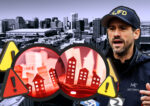It doesn’t pay to build homes in San Jose.
Higher interest rates and soaring construction and labor costs have curtailed home building across the Bay Area’s largest city, the San Jose Mercury News reported, citing a new report.
The prospect for building both market-rate and affordable homes in the South Bay city remains “bleak” as builders face “numerous challenges” and economic pressure on various fronts, according to the city’s residential feasibility study.
For the second year in a row, the report examined the cost feasibility of five different types of properties in San Jose. None of them penciled out.
“Worse than last year,” Nanci Klein, head of economic development for San Jose, told the newspaper. “Unless something crazy changes, we’re not going to get much development, housing or commercial.”
In the past year, the cost of building one unit of affordable housing in San Jose grew 24 percent to $938,700, from $757,900, according to the report. The San Jose costs are 26 percent higher per unit than in other Bay Area counties because of a labor shortage and higher wages.
The cost of building five- to 22-story market-rate housing projects in the city causes potential developers to lose hundreds of thousands of dollars for each project. Meanwhile, rents are flat or have fallen across the region, leaving new projects in the red.
Even if rents rose by 5 percent or construction costs fell by 5 percent, it wouldn’t make much difference, according to the report.
Developers didn’t break ground on any market-rate apartment project in Silicon Valley from January through June, according to CoStar.
The cost of transportation projects also has soared. That includes San Jose’s BART extension, which has seen its estimated cost nearly double over the last three years to $12.2 billion, with its expected opening delayed three years to 2036.
Interest rates, now at a 23-year high, remain the key stumbling block to building market-rate and affordable housing. At the same time, operating costs for developers have spiked because of rising insurance rates.
“Interest rates have really shut down the capital markets,” Shawn Milligan, a San Jose-based developer, told the Mercury News. “You can’t borrow at 9 or 10 percent and underwrite a project. It’s impossible. It was possible when interest rates were 3 percent. It has kind of turned everything upside down.”
This has created a vicious cycle, added Louis Mirante, vice president of public policy at the Bay Area Council.
“The fewer projects, the less labor there is,” he told the newspaper. “The less labor there is, the fewer projects there are. That death spiral is going on.”
Meanwhile, state regulators still haven’t approved San Jose’s required Housing Element plan to add 62,200 homes by 2031.
— Dana Bartholomew
Read more



